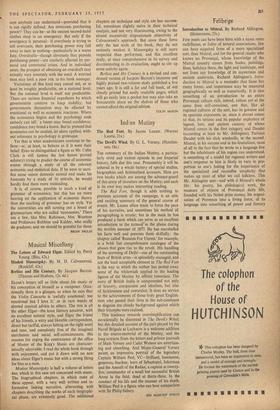Indian Mutiny
THE centenary of the Indian Mutiny, a particu- larly vivid and violent episode in our Imperial history, falls due this year. Presumably it will be ushered in by a whole battery of special studies, biographies and fictionalised accounts. Here are two books which are among the advance-guard of this army of literature on the Mutiny, and each in its own way makes interesting reading.
The Red Fort, though it adds nothing to previous accounts of the campaign, is an able and exciting summary of the general course of events. Mr. Leasor often tends to force the pace of his narrative, and sometimes his method of paragraphing is erratic; but in the main he has produced a book which can serve as an excellent introduction to the turmoil* in the plains during the terrible summer of 18$7. He has marshalled his facts well and presents them skilfully : the chapter called 'Reasons For Unrest,' for example, is a brisk but comprehensive catalogue of the abuses that gave rise to the revolt. His handling of the storming of Delhi—one of the outstanding feats of British arms—is splendidly managed, and not the least acceptable element in The Red Fort is the way in which the author has peeled away some of the whitewash applied to the leading figures of the Mutiny by official historians. The story of British India is compounded not only of bravery, compassion and idealism, but also of fecklessness and cowardice. It does no service to the achievements of those truly great English- men who passed their lives in the sub-continent to disguise the cloudy background against which their triumphs were realised.
This tendency towards oversimplification can occasionally be discerned in The Devil's Wind; but this detailed account of the part played by the Naval Brigade at Lucknow is a welcome addition to the source-material of the Mutiny, and the long extracts from the letters and private journals of Mate Verney and Cadet Watson are entertain- ing and absorbing. And Major-General Verney paints an impressive portrait of the legendary Captain William Peel, VC—brilliant, handsome, generous, fearless; hero of Sebastopol, Inkerman and the Assault of the Redan; a captain at twenty- five; commander of a small but successful British Army in the field; dead at thirty-three. In the conduct of his life and the manner of his death, William Peel is a figure who can bear comparison with Sir Philip Sidney.
JON MANCHIP WHITE


































 Previous page
Previous page